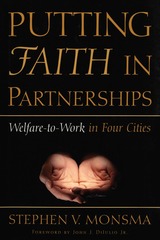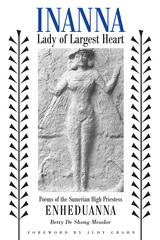
A front-burner issue on the public policy agenda today is the increased use of partnerships between government and nongovernmental entities, including faith-based social service organizations. In the wake of President Bush's faith-based initiative, many are still wondering about the effectiveness of these faith-based organizations in providing services to those in need, and whether they provide better outcomes than more traditional government, secular nonprofit, and for-profit organizations. In Faith, Hope, and Jobs, Stephen V. Monsma and J. Christopher Soper study the effectiveness of 17 different welfare-to-work programs in Los Angeles County—a county in which the U.S. government spends 14% of its entire welfare budget—and offer groundbreaking insight into understanding what works and what doesn't.
Monsma and Soper examine client assessment of the programs, their progress in developing attitudes and resources important for finding self-supporting employment, and their experience in finding actual employment. The study reveals that the clients of the more explicitly faith-based programs did best in gaining in social capital and were highly positive in evaluating the religious components of their programs. For-profit programs tended to do the best in terms of their clients finding employment. Overall, the religiously active respondents tended to experience better outcomes than those who were not religiously active but surprisingly, the religiously active and non-active tended to do equally well in faith-based programs.
Faith, Hope, and Jobs concludes with three sets of concrete recommendations for public policymakers, social service program managers, and researchers.

Is the "private" experience of religion counterproductive to engagement in public life? Does the "public" experience of religion contribute anything distinctive to civic engagement? Pews, Prayers, and Participation offers a fresh approach to key questions about what role religion plays in fostering civic responsibility in contemporary American society. Written by five prominent scholars of religion and politics, led by Calvin College's Corwin Smidt, the book brilliantly articulates how religion shapes participation in a range of civic activities—from behaviors (such as membership in voluntary associations, volunteering, and charitable contributions) to capacities (such as civic skills and knowledge), to virtues (such as law-abidingness, tolerance, and work ethic).
In the course of their study the authors examine whether an individual exhibits a diminished, a privatized, a public, or an integrated form of religious expression, based on the individual's level of participation in both the public (worship) or private (prayer) dimensions of religious life. They question whether the privatization of religious life is counterproductive to engagement in public life, and they show that religion does indeed play a significant role in fostering civic responsibility across each of its particular facets.
Pews, Prayers, and Participation is a bold and provocative clarion call to the continuing importance and changing nature of religion in American public life. It will be of particular interest to students and scholars of religion and politics, and culture and politics, as well as general readers with an interest in the impact of religion in the public sphere.

In this groundbreaking study of a politically controversial topic---the debut offering in Alan Wolfe's Contemporary Political and Social Issues series---author Stephen Monsma avoids overheated rhetoric in favor of a careful, critical analysis of the hard evidence on whether public-private partnerships really work.
The book is based on in-depth studies of social service programs in Los Angeles, Chicago, Philadelphia, and Dallas. By examining public-private partnerships between government offices and nonprofit organizations, Monsma seeks to understand how these partnerships affect the balance between government's efforts to deal with social problems and the rights of individual citizens to control their own lives.
Putting Faith in Partnerships answers many previously unanswered questions in what may be the most controversial public policy debate today: about the feasibility and wisdom of government agencies forming partnerships with private organizations to provide essential public social services.
Stephen V. Monsma is Professor of Political Science at Pepperdine University. He has served as director of the Office of Quality Review in Michigan's Department of Social Services and is a widely recognized expert on the role of faith-based organizations in social service programs.
READERS
Browse our collection.
PUBLISHERS
See BiblioVault's publisher services.
STUDENT SERVICES
Files for college accessibility offices.
UChicago Accessibility Resources
home | accessibility | search | about | contact us
BiblioVault ® 2001 - 2025
The University of Chicago Press









